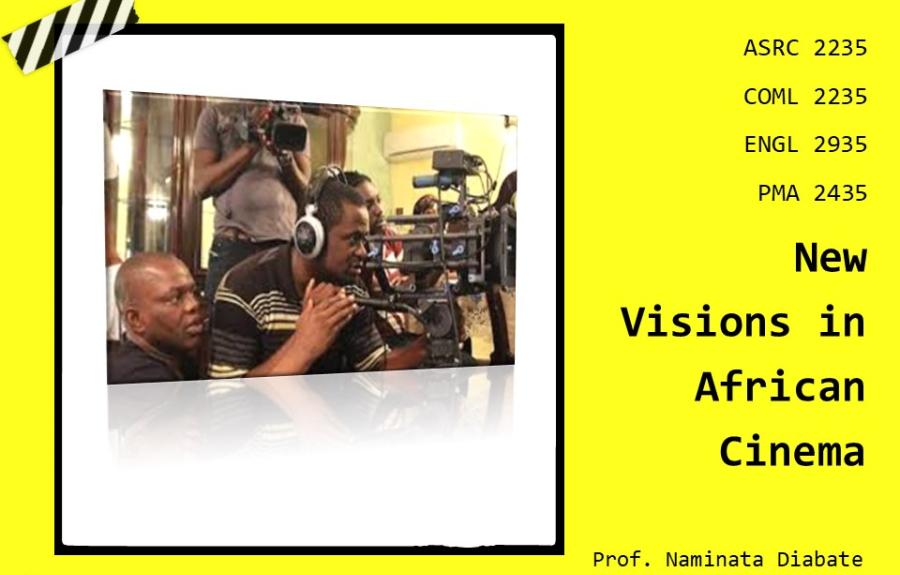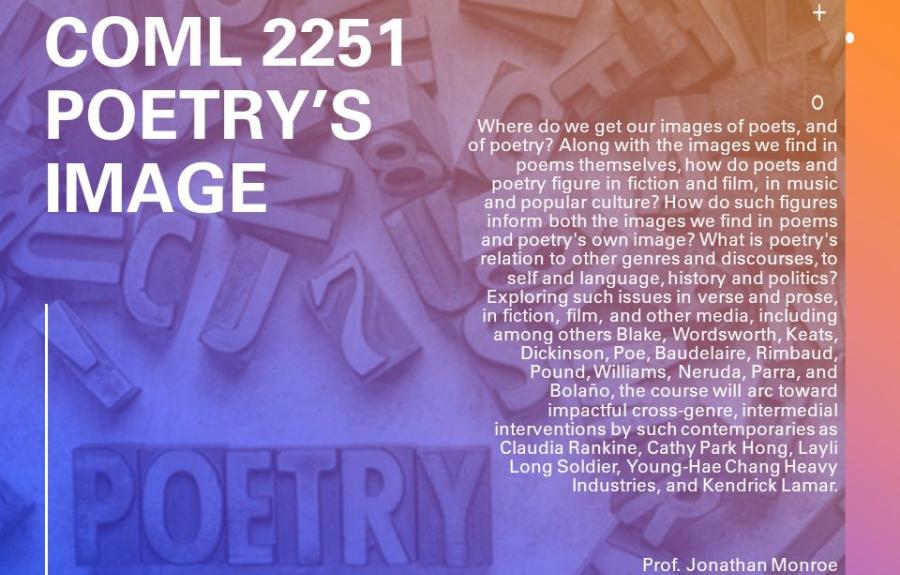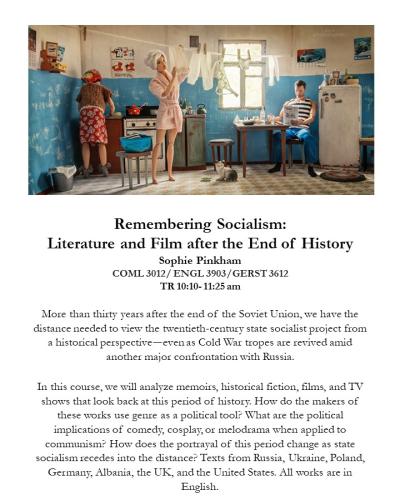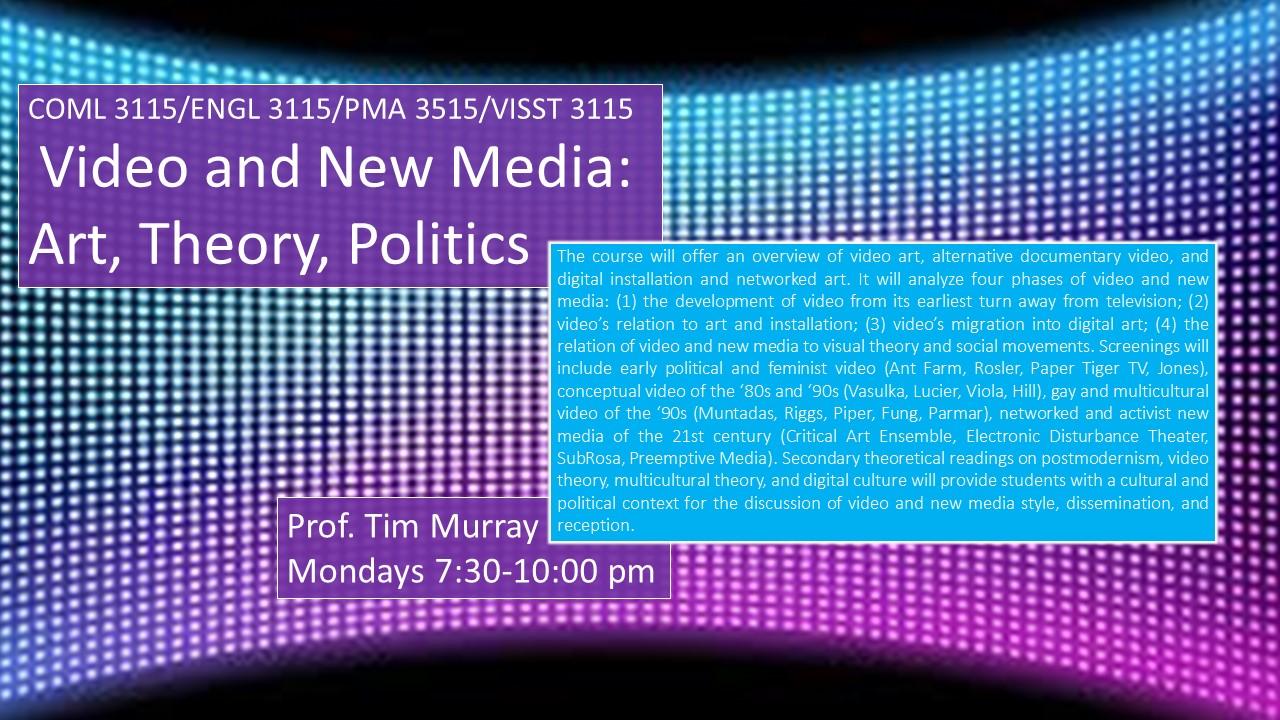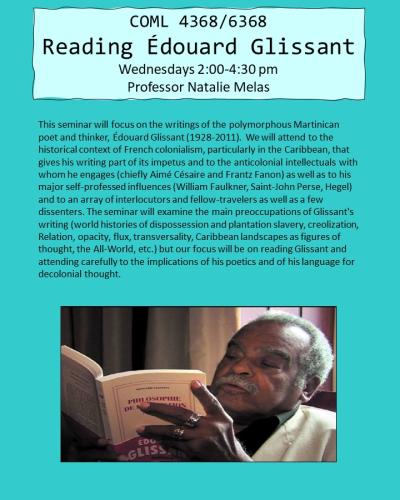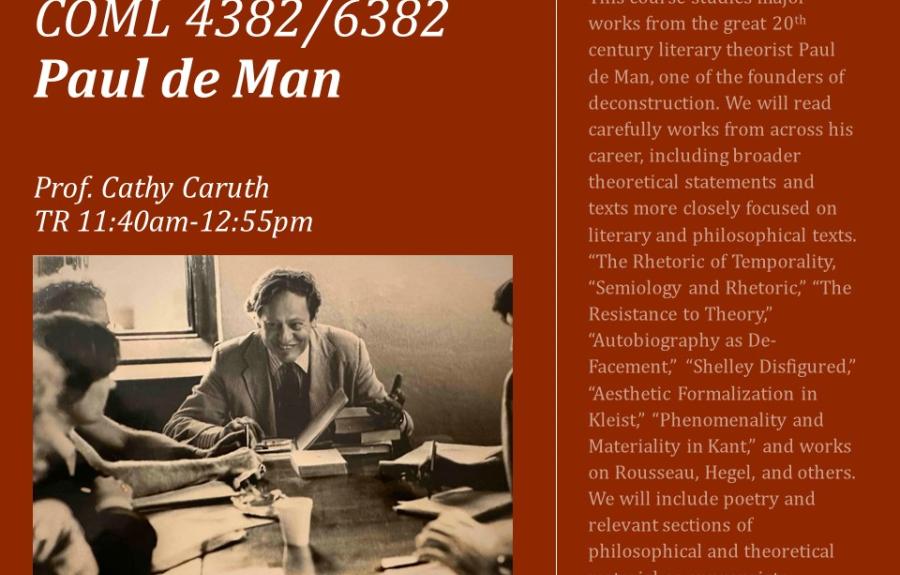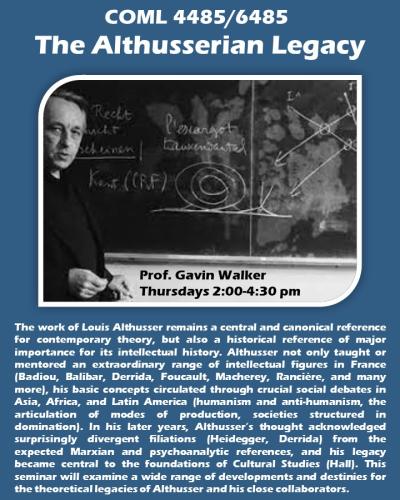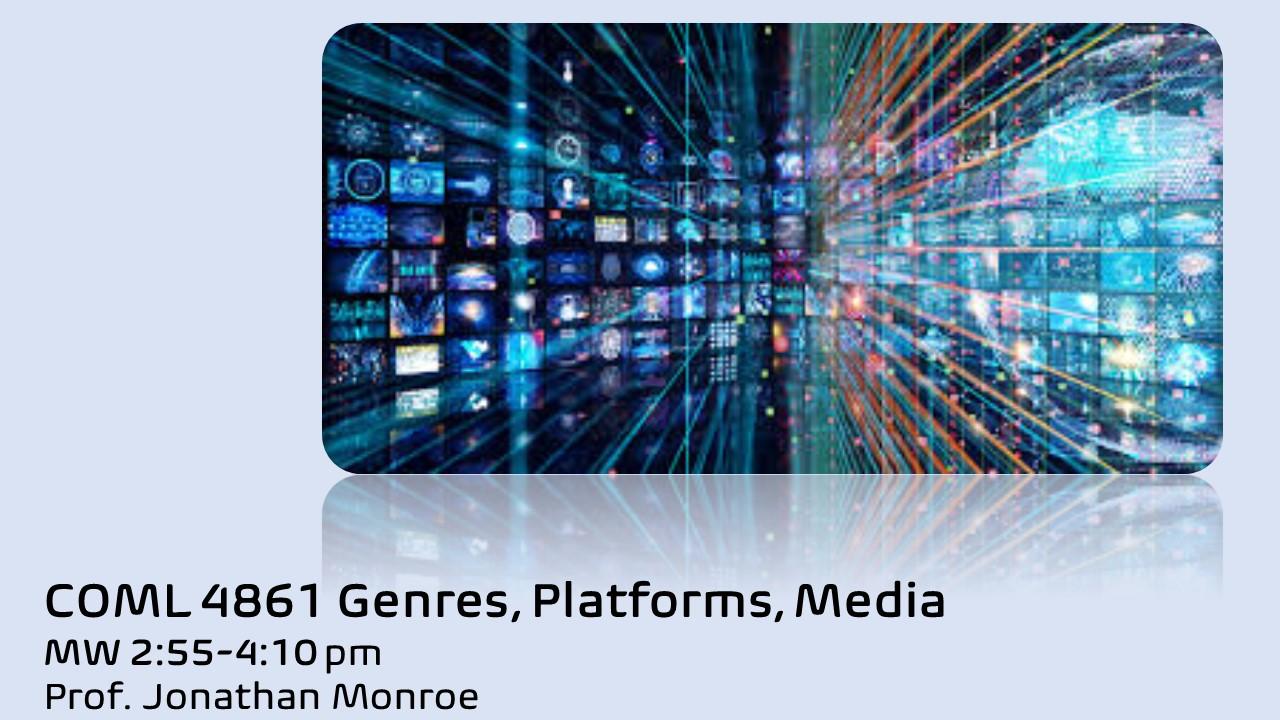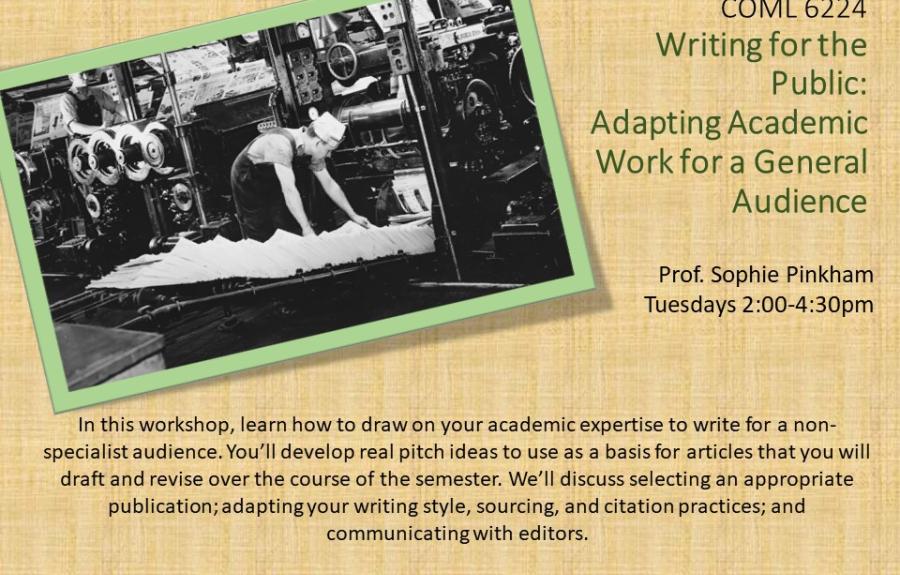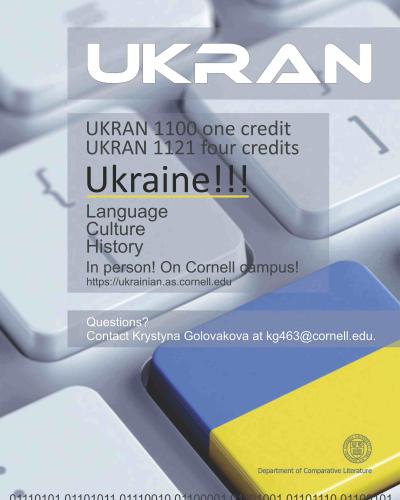COML 2235 - New Visions in African Cinema
MW 11:40 am-12:55 pm
Prof. Naminata Diabate
This undergraduate course introduces the formal and topical innovations that African cinema has experienced since its inception in the 1960s. Sections will explore, among others, Nollywood, sci-fi, and ideological cinema. Films include: Abderrahmane Sissako's Bamako, Mohamed Camara's Dakan, Djibril Diop Mambéty's Touki-Bouki, Cheikh Oumar Sissoko's Finzan, Anne-Laure Folly's Women with Open Eyes, Ousmane Sembène's Camp de Thiaroye, Jean-Pierre Bekolo's Quartier Mozart.
COML 2251 - Poetry's Image
MWF 1:25-2:15 pm
Prof. Jonathan Monroe
Where do we get our images of poets, and of poetry? Along with the images we find in poems themselves, how do poetry and poets figure in fiction and film, in music and popular culture? How do such figures inform both the images we find in poems and poetry's own image? What is poetry's relation to other genres and discourses, to self and language, history and politics? Exploring such issues in verse and prose, in fiction, film, and other media, including among others Blake, Wordsworth, Keats, Dickinson, Poe, Baudelaire, Rimbaud, Pound, Stein, Williams, Neruda, Parra, and Bolaño, the course will arc toward impactful recent interventions by such contemporaries as Cathy Park Hong, Claudia Rankine, Layla Long Soldier, Kendrick Lamar, and Young Hae Chang Heavy Industries.
COML 3012 - Remembering Socialism: Literature and Film After the End of History
TR 10:10 - 11:25 am
Prof. Sophie Pinkham
More than thirty years after the end of the Soviet Union, we have the distance needed to view the twentieth-century state socialist project from a historical perspective--even as Cold War tropes are revived amid another major confrontation with Russia. In this course, we will analyze memoirs, historical fiction, films, and TV shows that look back at this period of history. How do the makers of these works use genre as a political as well as artistic tool? What are the political implications of comedy, cosplay, or melodrama when applied to communism? How does the portrayal of this period change as state socialism recedes into the distance? Texts from Russia, Ukraine, Poland, Germany, Albania, the UK, and the United States.
COML 3115 - Video and New Media: Art, Theory, Politics
M 7:30 - 10:00 pm
Prof. Tim Murray
The course will offer an overview of video art, alternative documentary video, and digital installation and networked art. It will analyze four phases of video and new media: (1) the development of video from its earliest turn away from television; (2) video's relation to art and installation; (3) video's migration into digital art; (4) the relation of video and new media to visual theory and social movements. Screenings will include early political and feminist video (Ant Farm, Rosler, Paper Tiger TV, Jones), conceptual video of the '80s and '90s (Vasulka, Lucier, Viola, Hill), gay and multicultural video of the '90s (Muntadas, Riggs, Piper, Fung, Parmar), networked and activist new media of the 21st century (Critical Art Ensemble, Electronic Disturbance Theater, SubRosa, Preemptive Media). Secondary theoretical readings on postmodernism, video theory, multicultural theory, and digital culture will provide students with a cultural and political context for the discussion of video and new media style, dissemination, and reception.
COML 4368/6368 - Reading Édouard Glissant
W 2:00 - 4:30 pm
Prof. Natalie Melas
This seminar will focus on the writings of the polymorphous Martinican poet and thinker, Édouard Glissant (1928-2011). We will attend to the historical context of French colonialism, particularly in the Caribbean, that gives his writing part of its impetus and to the anticolonial intellectuals with whom he engages (chiefly Aimé Césaire and Frantz Fanon) as well as to his major self-professed influences (William Faulkner, Saint-John Perse, Hegel) and to an array of interlocutors and fellow-travelers as well as a few dissenters. The seminar will examine the main preoccupations of Glissant's writing (world histories of dispossession and plantation slavery, creolization, Relation, opacity, flux, transversality, Caribbean landscapes as figures of thought, the All-World, etc.) but our focus will be on reading Glissant and attending carefully to the implications of his poetics and of his language for decolonial thought.
COML 4382/6382 - Paul de Man
TR 11:40 am - 12:55 pm
Prof. Cathy Caruth
This course studies major works from the great 20th century literary theorist Paul de Man, one of the founders of deconstruction. We will read carefully works from across his career, including broader theoretical statements and texts more closely focused on literary or philosophical texts. “The Rhetoric of Temporality, “Semiology and Rhetoric,” “The Resistance to Theory,” “Autobiography as De-Facement,” “Shelley Disfigured,” “Aesthetic Formalization in Kleist,” “Phenomenality and Materiality in Kant,” and works on Rousseau, Hegel, and others. We will include poetry and relevant sections of philosophical and theoretical material as appropriate.
COML 4485/6485 - The Althusserian Legacy
R 2:00 - 4:30 pm
Prof. Gavin Walker
The work of Louis Althusser remains a central and canonical reference for contemporary theory, but also a historical reference of major importance for its intellectual history. Althusser not only taught or mentored an extraordinary range of intellectual figures in France (Badiou, Balibar, Derrida, Foucault, Macherey, Ranciere, etc), his basic concepts circulated through crucial social debates in Asia, Africa, and Latin America (humanism and anti-humanism, the articulation of modes of production, societies structured in domination). In his later years, Althusser's thought acknowledged surprisingly divergent filiations (Heidegger, Derrida) from the expected Marxian and psychoanalytic references, and his legacy became central to the foundations of Cultural Studies. This seminar will examine a wide range of developments and destinies for the theoretical legacies of Althusser and his close collaborators.
COML 4861/6851 - Genres, Platforms, Media
MW 2:55 - 4:10 pm
Prof. Jonathan Monroe
How do questions of genre persist and evolve in the digital age? To what extent do we choose our genres, and in what ways do they choose us? How do genres, platforms, and media intersect and inform one another? What hierarchies do they establish, and to what purposes? What are the implications of such questions for what Jacques Ranciere has called the "distribution of the sensible," for democratic consensus and dissensus? Moving among websites, social media, and streaming services, from Poetry Foundation and PennSound to podcasts and serial TV, from FaceBook and Twitter to Instagram and YouTube, from Netflix and Amazon to Roku and Hulu, this course will explore the accelerating interplay of genres, platforms, and media and their impact in contemporary culture and politics.
COML 6224 - Writing for the Public: Adapting Academic Work for a General Audience
T 2:00 - 4:30 pm
Prof. Sophie Pinkham
This workshop-style course will address the question of how to draw on academic research and expertise to write for a non-specialist audience. We will discuss the benefits of public-facing writing; how to select a publication to pitch; how to pitch an article; and how to draft and revise an article once a pitch has been accepted. These skills will be developed through practice. Students will develop real pitch ideas to use as a basis for articles that will be drafted and revised over the course of the semester. We will discuss questions such as selecting appropriate venues, adapting to a new writing style, sourcing, citation practices, and communicating with editors.
Open to graduate students in all disciplines.
UKRAN 1100 Introduction to Ukraine
TBD
Prof. Krystyna Golovakova
The course offers a general overview of the geography, history, literature, cinema, fine arts, music, and language of this Eastern European country of some 40 million people. At various historical periods since the 18th century, Ukraine had been controlled by the Russian Empire and Soviet Union, gained independence in 1991, and become the target of a military invasion by Russian Federation in 2022. Through assigned readings, videos, and other materials, students will gain a degree of understanding of the historical and social forces that shape Ukrainian everyday life, natural environments, and popular culture, and its current place in Europe and the world.
UKRAN 1121 Introductory Ukrainian I
TBA
Prof. Krystyna Golovakova
This course teaches language as a gateway to Ukrainian literature, history, and arts and the means of communication in everyday life, offering thorough grounding in listening, speaking, reading, and writing.
On successful completion of Elementary Ukrainian I and II, students will have control of the basic linguistic structure and common core vocabulary of Ukrainian; converse with native speakers with a degree of confidence and grammatical accuracy; communicate in speech and writing on general subjects; read simple accounts of current events; and function successfully at Ukrainian schools, urban communities, stores, restaurants, theaters, etc.

